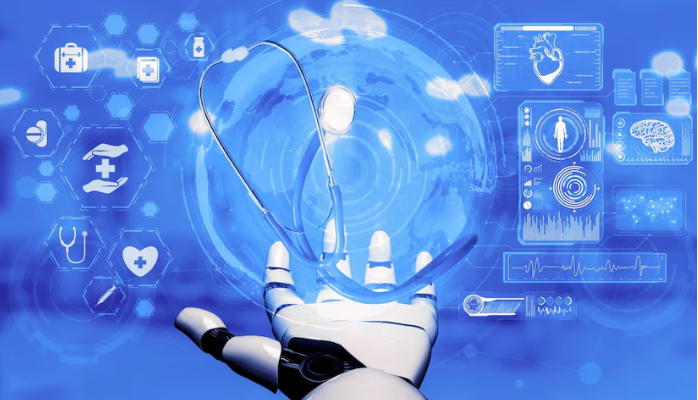Telemedicine has revolutionized healthcare delivery, and its combination with artificial intelligence (AI) has ushered in a new era of innovation. This synergy has enhanced diagnostics, improved patient care, and expanded access to medical services worldwide. In this article, we explore the applications, benefits, and emerging trends of AI in telemedicine, offering a detailed look into its transformative potential.
Telemedicine enables the remote delivery of healthcare services through digital platforms. When integrated with AI technologies, telemedicine platforms become smarter, offering predictive analytics, automated workflows, and personalized care. This combination empowers healthcare providers to deliver better services while reducing costs and inefficiencies.
Applications of AI in Telemedicine
AI is enhancing telemedicine in numerous ways, enabling smarter, more efficient care delivery. Below are the most impactful applications:
1. Remote Patient Monitoring
AI-driven wearable devices collect real-time health data, including heart rate, oxygen levels, and blood pressure. These devices alert healthcare providers to anomalies, ensuring timely interventions and preventive care.
2. Virtual Assistants for Healthcare
AI-powered virtual assistants streamline healthcare processes. They handle appointment scheduling, medication reminders, and patient inquiries, providing instant and reliable support.
3. AI-Driven Diagnostics
AI algorithms analyze medical images, lab tests, and clinical data to identify diseases with precision. For instance, AI is being used to detect cancerous growths, predict strokes, and diagnose chronic conditions early.
4. Personalized Treatment Planning
AI processes vast amounts of patient data to create customized treatment plans. By considering genetic, environmental, and lifestyle factors, AI ensures tailored healthcare solutions for each patient.
5. Mental Health Solutions
AI-powered platforms offer remote therapy sessions and mood tracking. Through sentiment analysis, these tools help therapists provide data-driven support for patients experiencing mental health challenges.
Benefits of AI in Telemedicine
The benefits of combining AI and telemedicine extend to patients, providers, and healthcare systems. Let’s examine the major advantages:
1. Greater Accessibility
AI-enabled telemedicine overcomes geographical barriers, bringing quality healthcare to underserved and remote areas. Virtual consultations allow patients to access specialists without traveling.
2. Cost Efficiency
AI minimizes unnecessary tests and hospital visits, reducing healthcare expenses. Automated systems further cut costs by streamlining administrative tasks.
3. Enhanced Diagnostic Accuracy
AI’s data analysis capabilities improve diagnostic precision, reducing human errors and supporting informed decision-making by healthcare professionals.
4. Improved Patient Engagement
Through AI-driven tools like chatbots, patients stay informed and engaged in their care. These platforms simplify processes and ensure patients adhere to treatment regimens.
5. Scalable Solutions
AI-powered telemedicine platforms can handle large patient volumes without compromising service quality, making them ideal for healthcare systems worldwide.
Future Trends in AI and Telemedicine
As AI continues to evolve, its role in telemedicine will expand in exciting ways. Here are the top trends to watch:
1. Predictive Healthcare
AI will analyze patient histories and lifestyle data to predict future health issues. This proactive approach will enable early intervention and reduce the burden of chronic diseases.
2. Integration with Wearable Technology
Smart devices like fitness trackers and health monitors will become more sophisticated, working seamlessly with AI to provide continuous care and real-time alerts.
3. Blockchain for Data Security
AI and blockchain will collaborate to safeguard sensitive patient data, ensuring privacy and compliance with healthcare regulations.
4. Advanced Multilingual Support
AI-powered telemedicine platforms will break language barriers, offering comprehensive healthcare solutions in multiple languages for global users.
5. Automation in Administrative Tasks
AI-driven robotic process automation (RPA) will simplify processes like billing, documentation, and patient intake, enabling healthcare providers to focus more on patient care.
The Role of AI Consulting in Healthcare
As AI continues to transform the telemedicine landscape, organizations often rely on the expertise of a Healthcare AI Consulting Company to implement these technologies effectively. Such companies provide strategic guidance, ensuring seamless integration of AI tools and platforms tailored to healthcare providers’ unique needs.
Additionally, AI Consulting Services help optimize healthcare operations by automating workflows, improving diagnostic accuracy, and enhancing patient care systems. These services ensure that healthcare providers stay ahead in an increasingly tech-driven industry.
Conclusion
The integration of AI into telemedicine is redefining the healthcare experience for patients and providers alike. By improving accessibility, enhancing accuracy, and enabling personalized care, this technology is setting new standards in medical services. As AI and telemedicine evolve together, they promise a future where healthcare is more proactive, inclusive, and efficient.

